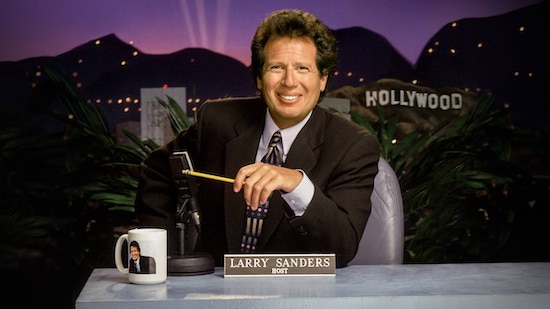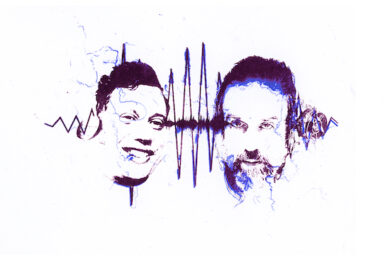Show idea: Behind the scenes with God, Angels, Jesus – Garry Shandling, 1998
We heard the booming voice of the announcer Hank Kingsley first, misreading the television studio’s applause sign as “applesauce”, thus creating The Larry Sanders Show’s first catchphrase. The voice continued, reminding the imaginary audience of this utterly unique talk show that they were important, imploring them to behave so that the host would respond in kind, and finally counting down into a remarkably original television series. The unlikely comedian Garry Shandling’s The Larry Sanders Show arrived on HBO in 1992, long before Larry David played his best and most cantankerous self on Curb Your Enthusiasm; well before Louis CK dared dream of vying for Letterman’s Late Show job on FX’s Louie. Oddly enough, it was contemporary with David Lynch spinning his wheels attempting to make a comedy series set backstage at a variety show, the four-episode failure, On the Air.
Where Lynch flopped, however, people flipped for the curiously loveable Shandling, who conceived of a refreshingly good-natured, sharp-as-nails, and most importantly, wickedly funny show-about-a-show behind-the-show, starring Shandling as his Bizarro self — his polar opposite, his arch nemesis, his own worst enemy — an enigma wrapped in a riddle, America’s best-known and most beloved fake talk-show host.
The Larry Sanders Show first aired on 15 August 1992, and remains one of the few series to successfully do comedy and comedy-about-a-comedy. To add another layer, the show was furthermore a comedy-about-comedy itself, a meditation on what was funny on TV at that time, and why. There was a loose attitude towards reality about each episode, every successive season of the show — it aired for six, ending in 1998 — sharing more and more intimate and at times cringeworthy revelations about its star and cast.
It all seemed real enough – after all, the storylines often were. There were real guests, much like a real talk show, with performances by real musicians, acting like their real selves: The Wu-Tang Clan, Chris Isaak, k.d. lang, Beck, The Butthole Surfers, Elvis Costello, Porno for Pyros. But then the camera would cut back to reveal cameras — plural — boom mics, a stage, a studio audience.
In this ingenuous gesture, Shandling pulled back the curtain on the curtain and made a meaningful statement about the nature of putting on a show – any show. The king of late-night David Letterman said it best: there is no off position on the genius switch.
In creating his Larry Sanders alter ego, Shandling outmaneuvered everyone else in the talk show game, including Letterman. This meant that he was able to enjoy the best of both worlds: hosting a reasonable facsimile of a show, and simultaneously playing the character of a neurotic host. All Shandling had to do was act naturally. “Larry and I are very different people,” said Shandling of his alter ego in a 1994 Rolling Stone interview, “He’s 43, and I’m 44.”
Shandling essentially invented the Larry Sanders persona with his first series for the FOX network, It’s Garry Shandling’s Show, and more specifically in its subsequent 1986 Showtime special, It’s Garry Shandling’s Show 25th Anniversary, a mock retrospective of a talk show that presented faux clips of zany antics from previous decades. In it, Shandling sported retro hairdos and appropriate fashions of the day, and the filmic images were treated to indicate aged media in the way that Instagram filters emulate the look of old Pol…





